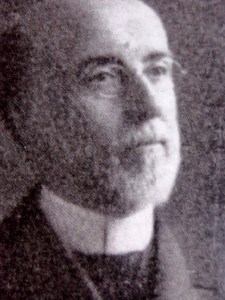Princes Foods led the global tinned lobster trade. Today its brands include Napolina, Jucee, Batchelors and Crisp N Dry.
Simpson & Roberts
William Muirhead Simpson (1842 – 1926) was born in Liverpool to Scottish-born baker parents.
Simpson had entered into partnership with Francis George Carvill, a Liverpool merchant, by 1872. Simpson left Francis Carvill & Son in 1878. The move was to prove fortuitous, as the firm collapsed with debts of £300,000 in 1883.

Simpson entered into partnership with Frank Roberts (1853 – 1938), a native of New Brunswick, Canada, from 1880.
Simpson & Roberts began to import tinned lobster into Britain. Simpson managed the head office at 20 Redcross Street, Liverpool, while Roberts managed operations at Halifax, Canada.

Thomas Edward Dickinson (1866 – 1962) was taken on as an apprentice, and was the first employee.
The partnership originally sold its products under the Simpson Roberts brand until the Maypole brand was introduced for tinned lobster from 1891. The Mikado name was introduced for tinned meats and fish from 1895. The Princes brand was introduced from 1900.
Simpson & Roberts established operations in Vancouver to produce tinned salmon from 1902. The site also imported fruit from California for canning.
William Muirhead Simpson retired from the partnership in 1907, leaving Frank Roberts, David Thomson and Henry Pythian Simpson to manage the business. At this juncture, Frank Roberts relocated to Liverpool to manage operations from there.
Simpson Roberts & Co had relocated to 46 Stanley Street, Liverpool by 1910.
Simpson Roberts & Co was the largest exporter of lobster in the world by 1915, and handled one third of the world’s output from sites at Charlottetown, Prince Edward Island; Shediac, New Brunswick; St John’s, Newfoundland and Vancouver.
The partnership became an incorporated company in 1919. Thomas E Dickinson was appointed chairman.
Vancouver became the Canadian headquarters from 1920.
Simpson died in 1926 with an estate valued at £86,710.
Company capital was reduced from £250,000 to £212,000 in 1929.
There were 21 Princes product lines by 1936. That year a larger warehouse and distribution centre had to be built to cope with demand. Across six floors, it was one of the most up to date canned goods warehouses in Britain.
Frank Roberts died in 1938 with an estate valued at £142,141.
Simpson & Roberts capital was increased to £500,000 in 1958. By this time canned fruit had joined canned fish as a major product line. That year, tinned foods sales increased by 17 percent, whilst Princes branded foods increased by 30 percent.
Princes Foods and subsequent ownership
Simpson & Roberts changed its name to Princes Foods from 1962. Profits at the company rapidly declined between 1964 and 1968.
J Bibby & Sons, a Liverpool shipping firm which owned Trex cooking fat and a line of sandwich spreads, acquired Princes for £3.25 million in 1968.
The integration of the two businesses was to prove more difficult than anticipated. Bibby entered into financial difficulty, and sold Princes to Buitoni, an Italian foods group, in 1973.
Buitoni introduced canned imported vegetables and corned beef to the Princes product range.
Buitoni was acquired by Nestle of Switzerland in 1988, who sold Princes to Mitsubishi of Japan the following year.
Princes held 25 percent of the British canned fish and cold meats markets by 1989. A factory in Southport, Lancashire employed about 200 people.
Mitsubishi provided global presence and extensive financial capital for Princes. Princes entered into soft drink production with the acquisition of G Barraclough in 1991.
Princes was the largest importer and distributor of canned foods in Britain by 1997. The company employed 250 people. It was a market leader in corned beef.
Princes acquired a fish cannery on the island of Mauritius in 1999.
Princes acquired control of Beta Foods, manufacturer of Shippams fish paste, in 2001.
Princes employed 3,200 people by 2010.
Princes acquired the canning operations of Premier Foods for £182 million in 2011.
Princes was the largest supplier of tinned food in Britain by 2013. The company employed 6,000 people across 14 production sites. 20 percent of sales were overseas.
Princes extended its shareholding in the Napolina Italian foods brand from 76 to 100 percent in 2014.
Princes employed 7,000 people globally by 2020, including 2,200 in Britain.
2 thoughts on “Building scale: a history of Princes Foods”